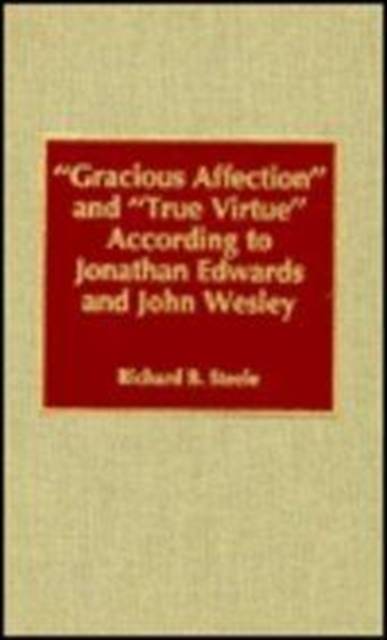
- Retrait gratuit dans votre magasin Club
- 7.000.000 titres dans notre catalogue
- Payer en toute sécurité
- Toujours un magasin près de chez vous
- Retrait gratuit dans votre magasin Club
- 7.000.000 titres dans notre catalogue
- Payer en toute sécurité
- Toujours un magasin près de chez vous
'Gracious Affection' and 'True Virtue' According to Jonathan Edwards and John Wesley
Richard B Steele
135,95 €
+ 271 points
Description
John Wesley (1703-1791) and Jonathan Edwards (1703-1758) were both practitioners and theoreticians for the "revivals" of the eighteenth century. Both played determinative roles in English and American ecclesial development and, during the nineteenth and twentieth centuries, have served as models and mentors for the varieties of evangelicalism throughout the world. During their own lifetimes, Wesley and Edwards were aware of each other. Wesley even edited and published works of Edwards for the edification of his followers. Despite significant theological disagreements, Wesley and Edwards have much in common, especially in their "experimental theologies"--that is, their theories of the interaction between religious emotion and moral character. Steele's volume analyzes for the first time, on the basis of the extant texts, the historical and literary relationships between the two theologians. On the basis of this work, the doctrinal, ethical, and pastoral stances of Wesley and Edwards are compared and contrasted. It is a goal of the Pietist and Wesleyan Studies to contribute to the process of reexamining the traditional ways of understanding Wesley and his context. "Gracious Affection" and "True Virtue" According to Jonathan Edwards and John Wesley has serious implications for understanding the development of Wesleyan thought and trans-Atlantic revivalism as well as for American and British intellectual and religious history.
Spécifications
Parties prenantes
- Auteur(s) :
- Editeur:
Contenu
- Nombre de pages :
- 453
- Langue:
- Anglais
- Collection :
- Tome:
- n° 5
Caractéristiques
- EAN:
- 9780810828216
- Date de parution :
- 01-10-94
- Format:
- Livre relié
- Format numérique:
- Genaaid
- Dimensions :
- 140 mm x 220 mm
- Poids :
- 648 g







